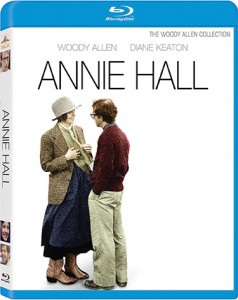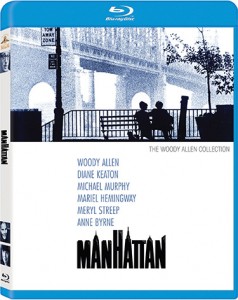 Annie Hall established Allen as one of the most important filmmakers of the 70’s and set him on the path to critical adulation that he’s sometimes had a hard time living up to. The movie won four Academy Awards – Best Actress (Diane Keaton), Best Screenplay (Allen and Marshall Brickman), Best Director and Best Picture- in 1977 and could have won for Best Editing thanks to the seamless work of Ralph Rosenblum piecing together Allen’s non-linear romantic comedy. The film contains a lot of the slapstick, absurd humor of his earlier “funnier” comedies, yet he also incorporated a seriousness and introspective tone when looking at the birth, life and death of a relationship. The movie is sweet, funny, poignant, and occasionally bitter and still remains one of his best movies.
Annie Hall established Allen as one of the most important filmmakers of the 70’s and set him on the path to critical adulation that he’s sometimes had a hard time living up to. The movie won four Academy Awards – Best Actress (Diane Keaton), Best Screenplay (Allen and Marshall Brickman), Best Director and Best Picture- in 1977 and could have won for Best Editing thanks to the seamless work of Ralph Rosenblum piecing together Allen’s non-linear romantic comedy. The film contains a lot of the slapstick, absurd humor of his earlier “funnier” comedies, yet he also incorporated a seriousness and introspective tone when looking at the birth, life and death of a relationship. The movie is sweet, funny, poignant, and occasionally bitter and still remains one of his best movies.
Allen stars as Alvy Singer, a stand-up comic reflecting on his love affair with the quirky, lovely Annie Hall (the great Keaton). They meet, fall in love and eventually break up. Except, that’s not all there is, as Allen breaks the fourth wall on a number of occasions, offers glimpse inside his character’s minds while their involved with pointless conversations, and even shows Annie’s subconscious remove itself from her physical body while she and Alvy have sex. Influenced, in part, by the European cinema he was drawn to at the time, Allen crafted a film that jumps around in time, showing us the various loves of Alvy’s life and how his neuroses and faults destroyed all of those romances, as well as his one with Annie. Allen does a fine acting job in the film; I don’t think he gets enough credit for how well he holds everything together. But the real star is Keaton, who simply shines as Annie and became an icon because of the role.
 Allen followed up Annie Hall with the drama, Interiors, which threw his new fans for a loop, most of them expecting another romantic comedy. In 1979, his released Manhattan, his love letter to his hometown. With its beautiful black and white photography and a score consisting of Gershwin classics, Manhattan certainly gives you the feel of New York City in the late 1970’s and a sense of the great city’s history. As a narrative, it is much heavier than Annie Hall, as if some of the darkness of Interiors had seeped into the screenwriting of Manhattan.
Allen followed up Annie Hall with the drama, Interiors, which threw his new fans for a loop, most of them expecting another romantic comedy. In 1979, his released Manhattan, his love letter to his hometown. With its beautiful black and white photography and a score consisting of Gershwin classics, Manhattan certainly gives you the feel of New York City in the late 1970’s and a sense of the great city’s history. As a narrative, it is much heavier than Annie Hall, as if some of the darkness of Interiors had seeped into the screenwriting of Manhattan.
Allen stars as Isaac, 42-year-old divorced writer who is dating Tracy, a 17-year old high school student played with real depth by young Mariel Hemingway. Isaac’s best friend, Yale (Michael Murphy) is married, but having an affair with Mary (Keaton). When Isaac first meets Mary, she annoys him. As they get to know each other, an attraction grows. Yale breaks up with Mary and convinces Isaac to ask her out. Since Isaac has always felt that his relationship with Tracy would never last, he begins seeing Mary. Two love triangles form and Isaac is stuck in the middle of both of them. Whether he will end up with Mary or Tracy in the end leads to one of the greatest and most imitated endings in modern cinema (see When Harry Met Sally…). Elsewhere, Isaac must deal with his ex-wife (Meryl Streep) who is writing a tell-all book about their failed marriage.
Manhattan finds Allen falling into the storytelling pattern of most of his 80’s films: large ensembles with multiple storylines and a skilled blend of comedy and drama. If you are a fan of Hannah and Her Sisters or Crimes and Misdemeanors, then Manhattan is right up your alley. The cast is phenomenal, even the minor roles played by Wallace Shawn and Emily Byrne. Keaton and Allen are great, once again, and the relatively new Streep sizzles on screen. Despite all of the film’s fine qualities, I’ve always had trouble with the “ick” factor of a middle-aged man dating a teenage girl (no matter how mature she is). While the film is filled with many wonderful moments and some very insightful writing, I just can’t get past that part.
Both Blu-rays come with no bonus features to write home about. The theatrical trailers are included. If you want to find out more about Woody Allen and the making of these films, you’ll have to hunt down the PBS American Masters documentary that aired last fall.





Comments